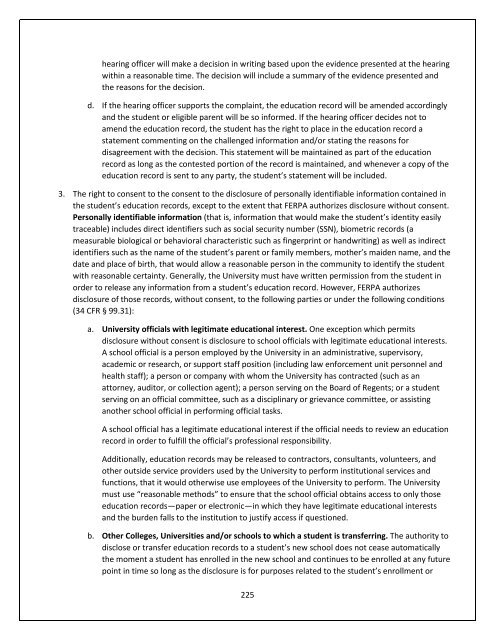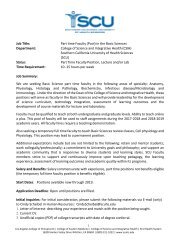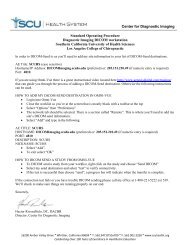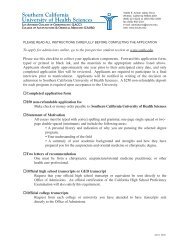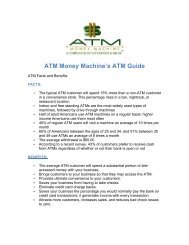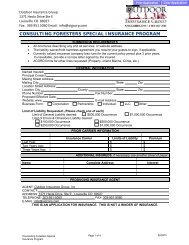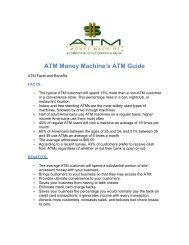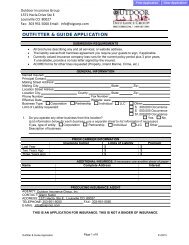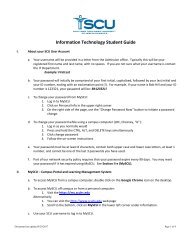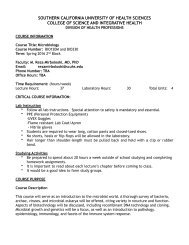Vision, Mission, and Guiding Principles for SCUHS
Southern California University of Health Sciences will be recognized as the premier evidence-based integrative healthcare university. in this PDF we are discussing about our Vision, Mission, and Guiding Principles. Please have a look. you can also go with this link: https://bit.ly/2JuIItL
Southern California University of Health Sciences will be recognized as the premier evidence-based integrative healthcare university. in this PDF we are discussing about our Vision, Mission, and Guiding Principles. Please have a look. you can also go with this link: https://bit.ly/2JuIItL
Create successful ePaper yourself
Turn your PDF publications into a flip-book with our unique Google optimized e-Paper software.
hearing officer will make a decision in writing based upon the evidence presented at the hearing<br />
within a reasonable time. The decision will include a summary of the evidence presented <strong>and</strong><br />
the reasons <strong>for</strong> the decision.<br />
d. If the hearing officer supports the complaint, the education record will be amended accordingly<br />
<strong>and</strong> the student or eligible parent will be so in<strong>for</strong>med. If the hearing officer decides not to<br />
amend the education record, the student has the right to place in the education record a<br />
statement commenting on the challenged in<strong>for</strong>mation <strong>and</strong>/or stating the reasons <strong>for</strong><br />
disagreement with the decision. This statement will be maintained as part of the education<br />
record as long as the contested portion of the record is maintained, <strong>and</strong> whenever a copy of the<br />
education record is sent to any party, the student’s statement will be included.<br />
3. The right to consent to the consent to the disclosure of personally identifiable in<strong>for</strong>mation contained in<br />
the student’s education records, except to the extent that FERPA authorizes disclosure without consent.<br />
Personally identifiable in<strong>for</strong>mation (that is, in<strong>for</strong>mation that would make the student’s identity easily<br />
traceable) includes direct identifiers such as social security number (SSN), biometric records (a<br />
measurable biological or behavioral characteristic such as fingerprint or h<strong>and</strong>writing) as well as indirect<br />
identifiers such as the name of the student’s parent or family members, mother’s maiden name, <strong>and</strong> the<br />
date <strong>and</strong> place of birth, that would allow a reasonable person in the community to identify the student<br />
with reasonable certainty. Generally, the University must have written permission from the student in<br />
order to release any in<strong>for</strong>mation from a student’s education record. However, FERPA authorizes<br />
disclosure of those records, without consent, to the following parties or under the following conditions<br />
(34 CFR § 99.31):<br />
a. University officials with legitimate educational interest. One exception which permits<br />
disclosure without consent is disclosure to school officials with legitimate educational interests.<br />
A school official is a person employed by the University in an administrative, supervisory,<br />
academic or research, or support staff position (including law en<strong>for</strong>cement unit personnel <strong>and</strong><br />
health staff); a person or company with whom the University has contracted (such as an<br />
attorney, auditor, or collection agent); a person serving on the Board of Regents; or a student<br />
serving on an official committee, such as a disciplinary or grievance committee, or assisting<br />
another school official in per<strong>for</strong>ming official tasks.<br />
A school official has a legitimate educational interest if the official needs to review an education<br />
record in order to fulfill the official’s professional responsibility.<br />
Additionally, education records may be released to contractors, consultants, volunteers, <strong>and</strong><br />
other outside service providers used by the University to per<strong>for</strong>m institutional services <strong>and</strong><br />
functions, that it would otherwise use employees of the University to per<strong>for</strong>m. The University<br />
must use “reasonable methods” to ensure that the school official obtains access to only those<br />
education records—paper or electronic—in which they have legitimate educational interests<br />
<strong>and</strong> the burden falls to the institution to justify access if questioned.<br />
b. Other Colleges, Universities <strong>and</strong>/or schools to which a student is transferring. The authority to<br />
disclose or transfer education records to a student’s new school does not cease automatically<br />
the moment a student has enrolled in the new school <strong>and</strong> continues to be enrolled at any future<br />
point in time so long as the disclosure is <strong>for</strong> purposes related to the student’s enrollment or<br />
225


